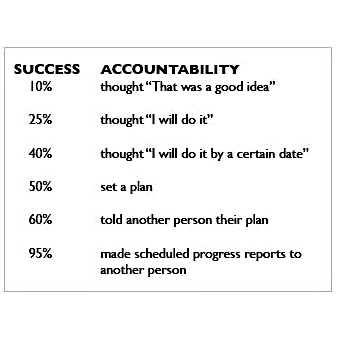To Keep Your Resolutions, Be ACCOUNTABLE!
Posted on January 31, 2015 by bob in In Every Life
Did you make a New Year’s resolution or goal? If so, what is the status at one month? Has it been achieved, still in process, or forgotten?
A new year prompts people to consider how to better themselves. However, a survey sponsored by Google found only 20 to 40 percent of people keep resolutions. Research shows adhering to healthy habits such as maintaining a normal weight, getting 2.5 hours a week of exercise, eating a healthy diet and not smoking can reduce a woman’s chances of getting heart disease by 90 percent over 20 years (The Journal of the American College of Cardiology).
Even so, the most-broken resolutions include health promotion activities — losing weight, exercising more, eating healthier, stopping smoking, managing stress, making or saving more money, or improving a relationship.
Changes in behavior begin with contemplating the benefits and potential barriers to action.
Recommendations from healthcare providers or evidence from studies such as the one above provide motivation to pursue an action. After beginning the action, difficulty often occurs in maintaining the change.
As February begins, this may be your experience.
One factor that can impede accomplishment is not setting realistic goals. Goals must be simple—one or two things that CAN be accomplished. Then, focus on making goals measurable. “I want to improve my health” is not measurable; “I will walk one mile, five days-a-week” is measurable and can be evaluated as met, partially met, or not achieved.
Another factor related to keeping goals involves being held accountable. One source relates success rates in accomplishing goals to a variety of accountability levels:
A third factor linked to changing habits relates to determining the level of motivation needed to make any change. For example:
On a scale of 1 to 10, how motivated are you to make the change? If you answer 7, why is it 7 rather than 5? What would it take for you to be motivated at a level 9 instead of 7? These answers help you identify what really is your motivation.
Then, on another scale of 1 to 10, how likely do you believe that you will actually accomplish and maintain the change? If the answer is 5 out of 10, why is it 5 rather than 3?
This answer provides insight into forces that will help you achieve your goal.
Then consider why is it 5 rather than 8? This answer will help you to identify barriers that will need to be overcome.
Setting specific goals, finding a person with whom to discuss progress or barriers, and identifying levels of motivation or barriers can help revive resolutions that are becoming stagnant. I wish for you a happy and healthy 2015!
 Arlene H. Morris, EdD, RN, CNE, is Professor of Nursing, Auburn Montgomery School of Nursing, and Immediate Past President of the AL State Nurses Association. Reach her at amorris@aum.edu.
Arlene H. Morris, EdD, RN, CNE, is Professor of Nursing, Auburn Montgomery School of Nursing, and Immediate Past President of the AL State Nurses Association. Reach her at amorris@aum.edu.










